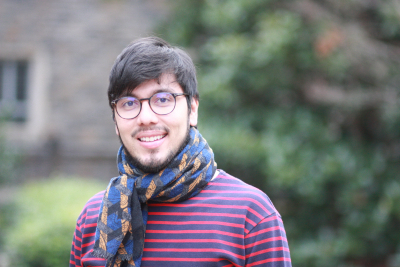Nestor Lovera Nieto, 2023-24 HOPE Center Visiting Scholar

A large part of economics deals with what economists call “welfare,” or the overall well-being (however defined) of people in the economy. Welfare economics emerged in the early twentieth century, and in its early days concerned itself with so-called market failures. A market failure usually occurs when there’s little to no incentive for an individual or business to either produce something that would benefit society as a whole—say, a new highway—or to avoid producing something that is harmful, the classic example being pollution from a factory.
Welfare economics thus deals with normative concerns, or the way things ought to be. Should a new highway be built? Should the laundromat be allowed to go on contaminating the local groundwater?
“Those kinds of questions, as asked by economists and as dealt with by economists, are what fascinate me about the subject,” says Nestor Lovera Nieto, a 2023–24 HOPE Center Visiting Scholar.
More to the point, Nestor is assessing whether we have made any progress in normative economics and what progress might look like.
“The first form of welfare economics seeks to calculate the well-being of each individual and arbitrate between the gains in well-being of some and the loss of well-being of others,” explains Nestor, who completed his PhD in 2022 and is a lecturer in economics the Université de Reims Champagne Ardenne. “But by the 1940s, a new generation of welfare economists started to question it.” They sought to deduce from individual preferences the best collective decision, without considering interpersonal comparisons of utility, which were considered non-scientific.
However, in 1951, the Nobel Prize winner Kenneth Arrow concluded that there is no obvious and indisputable procedure for making collective choices that respect the diversity of individual values and preferences.
“This result created a major setback for new welfare economics,” Nestor says. “I’m thus looking at the potential of social choice theory and seeing if it can accomplish what the new welfare theory couldn’t. Can it make a contribution to the way we study the transition between these two forms of normative economics?”
To that end, Nestor, who has a PhD in economics and management from the University of Reims Champagne-Ardenne and Neoma Business School, is combing through Arrow’s papers, as well as the papers of other welfare economists such as William Baumol and Paul Samuelson, among others.
His current work builds on his dissertation, which combined the philosophy of economics and the history of economic thought to show that economists cannot avoid value judgments in normative economics.
Indeed, that notion—that economists perforce make value judgments, from the methods they use to the questions they ask—guides and gives direction to his research project as a whole.
Although he was born in Venezuela and grew up in Caracas, Nestor—who, as a fan of the Harry Potter novels, can sometimes be found wearing a Gryffindor scarf and sweater—is thrilled that he recently received his French citizenship.
“For the citizenship test, I was given a thirty-page document on French history to study, complete with Joan of Arc, Victor Hugo, and Charles de Gaulle.”
Nestor will return to France in August.